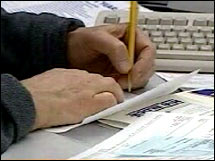|
The 'dirty dozen' tax scams
IRS says 'phishing' and zero wages are just some of the cons being run by tax cheaters and cheatees.
NEW YORK (CNNMoney.com) - A warning to tax cheats - your cover might already be blown. Whether you're the one being scammed or if you're trying to put one over on the IRS yourself, the tax agency says it's hip to the top tax scams for 2006, otherwise known as the "Dirty Dozen."
If you are part of the group that wants to do the right thing and pay Uncle Sam his fair share, be aware that there's a potential minefield out there when you are putting your W-2s and 1099s together this year. Phishing
To start with, identity thieves have started to pose as the IRS or financial institutions in an effort to "phish" personal information such as Social Security and credit card numbers from consumers. Never hand over sensitive information, the IRS warns, noting that it doesn't contact taxpayers via e-mail regarding questions with their accounts. Zero return
Taxpayers should also be aware of individuals offering tax-saving packages for a fee, according to the IRS. One particular scam involves promoters telling unsuspecting taxpayers that they can enter zero income on their federal income tax form and write "nunc pro tunc," a Latin phrase meaning "now for then," and that the IRS will disregard their original return that included wages and other income. In other instances, individual taxpayers have hatched similar schemes thinking they can lighten their yearly tax bill. Return preparer fraud
If you do opt for someone to do your taxes, be wary of those tax preparers who promise large refunds. Those individuals may be charging you higher fees and skimming from your tax return. In the eyes of the IRS, the taxpayer ultimately bears the responsibility of making sure their tax return is accurate. Credit counseling agencies
Besides keeping a close eye on the person who prepares your taxes, the IRS says that taxpayers should also be careful with credit counseling agencies, who may promise to provide financial guidance. Instead, individuals looking for help could find themselves saddled with even more debt and financial headaches. Tax cheaters on notice
At the same time, the IRS says not every American is straightforward when it comes time to file their tax return. If you're guilty of one of the tax cheating schemes listed below, you may find yourself facing the scrutiny of the IRS faster than you can say audit. Zero wages
One of the newest swindles on the IRS' radar this year are individuals that claim zero wages on a Form 4852 or a "corrected" 1099. While the system is meant to protect the taxpayer, such as an independent contractor, from an employer, some tax cheats have tried to exploit the system by claiming that he or she did not receive as much as an employer originally reported. Form 843 tax abatement
Tax abatement using form 843 is another new trick hucksters are trying out, according to the IRS, with individuals claiming they have never filed a tax return before or that a older return was sent but never received, hoping that the IRS will low-ball their estimated tax bill. Frivolous arguments
As much as you might want to argue that filling out a Form 1040 goes against both the Fourth Amendment right to privacy and the Fifth Amendment right against self-incrimination -- forget it. The IRS says these arguments have tried and failed in court. You may have the right to contest your liability later on, but that doesn't mean you can break the law, according to the IRS. Abuse of charitable organizations and deductions
While giving to charity is a great way to get a tax break, a growing number of individuals are taking advantage of the situation. Instead of making a simple donation, some cheats have moved income or assets into tax-free organization, but maintained control of the money, according to the IRS. Offshore transactions
It may be an ongoing battle for the IRS, but tax cheats are still prone to hiding income in offshore bank and brokerage accounts. In the fiscal year 2005, the IRS reported 68 individuals were convicted for promoting or using different schemes to avoid paying taxes. Trust misuse
As much as you would like to believe that putting your assets into a trust will result in lower income taxes, deductions or reduced estate or gift taxes, think again. Many trust do not deliver such tax benefits. Speaking with a professional first is the best move before transferring any funds, the IRS advises. Employment tax evasion
Employers aren't innocent either. Based on some shabby advice, some business owners have not collected federal income or other employment taxes from workers. But the IRS warns that those employers would face payment of those back taxes as well as penalties and interest. 'No Gain' deduction
And rounding out the list of tax con artists maneuvers is to claim deductions that equal their adjusted gross income, propped up by phony court documents. If a taxpayer believes they are being scammed or if they are aware of an ongoing scam they can get more information from the IRS Web site or by calling 1-800-829-1040. _____________________
Do you know these six 'don't-miss' tax breaks? Click here. |
|

